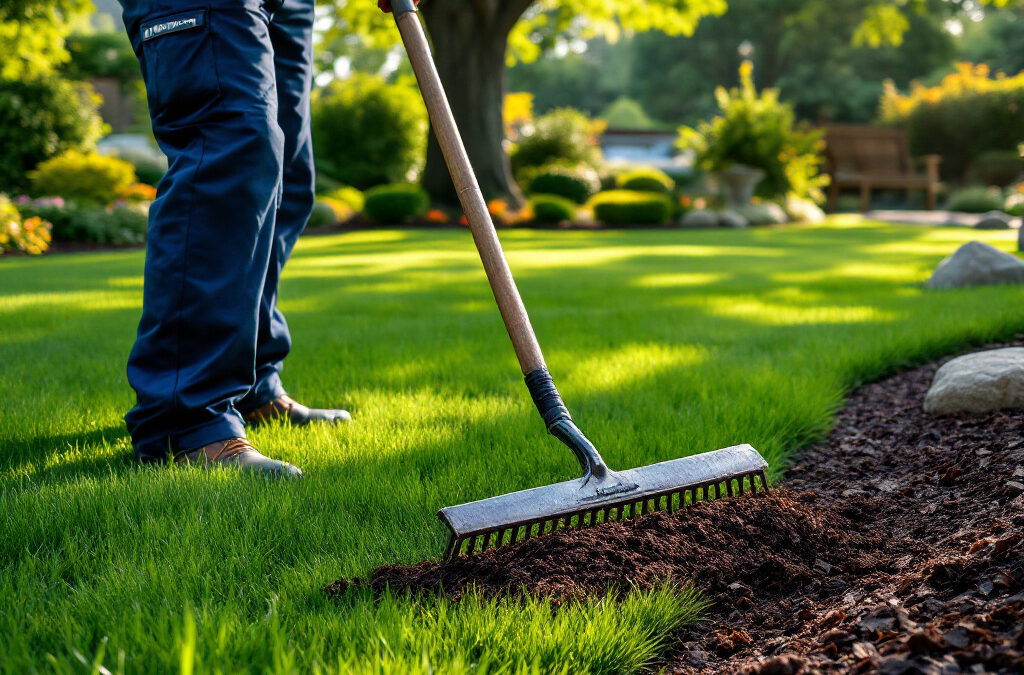Introduction
Maintaining a vibrant and healthy lawn is crucial for commercial properties, as it significantly contributes to overall curb appeal and enhances the brand image. One of the key practices that can greatly elevate lawn maintenance is mulching. This article explores the myriad benefits of mulching in enhancing the beauty and health of commercial lawns.
What is Mulching?
Mulching is a landscaping practice that involves covering the soil with a layer of material to provide various benefits. There are two main types of mulch: organic and inorganic. Organic mulches, such as wood chips, bark, and straw, improve soil health as they decompose, while inorganic mulches like rubber offer a durable solution that doesn’t break down.
Different mulching techniques can be employed, depending on the specific needs of the lawn. For instance, using shredded mulch around plants can conserve moisture, while larger chips may be better suited for pathways. Understanding these differences is essential for making informed decisions in commercial lawn care.
Benefits of Mulching in Commercial Lawn Care
Soil Health Improvement
One of the most significant benefits of mulching is its positive impact on soil health. By enhancing soil structure, mulch promotes better water infiltration and root development. Additionally, mulching increases moisture retention, which is particularly beneficial during dry periods, allowing plants to thrive.
Moreover, mulching supports the activity of beneficial microbes that play a vital role in nutrient cycling. Healthy soil contributes to robust plant growth, ensuring that commercial lawns remain lush and attractive throughout the year.
Weed Control
Another advantage of mulching is its effectiveness in controlling weeds. A thick layer of mulch suppresses weed growth by blocking sunlight, thus preventing weed seeds from germinating. This not only reduces competition for valuable nutrients and water but also decreases the need for chemical herbicides, promoting an eco-friendly approach to lawn care.
By minimizing weed-related issues, commercial property managers can save time and resources that would otherwise go into weeding tasks. This results in a more efficient lawn care routine and allows for a more focused investment in other landscaping elements.
Aesthetic Appeal
Mulching significantly enhances the aesthetic appeal of commercial properties. A well-mulched landscape creates a polished and professional appearance that can leave a lasting impression on clients and visitors. With various colors and textures available, mulch can complement existing landscape features and plant selections beautifully.
This visual enhancement can also play a role in branding, as a well-maintained lawn speaks volumes about a company’s commitment to quality and attention to detail. The right mulch not only improves visuals but also contributes to a harmonious outdoor space.
Temperature Regulation
Mulch serves as an effective insulator for soil, regulating temperature fluctuations. It keeps the soil cooler in the summer and warmer in the winter, protecting plant roots from extreme seasonal changes. This temperature stability fosters a more conducive environment for plant growth throughout the year.
By providing a protective layer, mulch helps shield plants during harsh weather conditions, thereby reducing stress on the landscape. This resilience is particularly important for commercial properties, where maintaining a healthy appearance is crucial for image and value.
Erosion Control
Soil erosion can pose significant challenges for commercial properties, particularly those with sloped landscapes. Mulching effectively reduces soil erosion caused by wind and water by providing a barrier that holds soil in place. This stabilization not only preserves the landscape integrity but also minimizes the need for costly soil replacement.
Implementing mulch as a protective measure contributes to long-term landscape sustainability, allowing commercial property owners to maintain their investments without constant repair efforts.
Cost-Effectiveness
Investing in mulching can lead to substantial cost savings in the long run. By improving moisture retention, mulching can lower irrigation costs, ensuring that lawns require less water to stay healthy. Additionally, reduced weeding translates to lower labor costs and less time spent on maintenance.
In turn, minimizing pesticide use not only cuts down on expenses but also promotes a healthier environment for both plants and local wildlife. Overall, mulching offers an economically viable solution for maintaining commercial lawns efficiently.
Best Practices for Implementing Mulching in Commercial Properties
Choosing the right type of mulch is key to maximizing its benefits in various environments. Factors like climate, soil type, and plant preferences should guide decisions. For instance, organic mulches may be suitable for garden beds, whereas rubber mulch could be effective for playgrounds.
Proper application techniques also play a crucial role in effectiveness. The ideal depth for mulch is generally between 2 to 4 inches, and it should be applied in a manner that allows for airflow, preventing moisture buildup that could lead to mold. Timing is essential too, as the best periods for mulching typically align with seasonal changes to optimize effectiveness.
Furthermore, ongoing maintenance of mulch layers is vital to ensure continued benefits. Regular checks for compaction and replenishing of mulch layers when they decompose will help sustain the desired advantages over time.
Case Studies/Examples
Successful commercial properties have showcased the remarkable benefits of mulching. For example, a local business park that implemented mulching around its landscaped areas reported a noticeable reduction in water usage by 30% following the mulching process. Additionally, the enhanced visual appeal attracted more visitors and tenants.
Measurable outcomes from these mulching practices demonstrate a clear correlation between mulching and improved property performance. By adopting such strategies, commercial property owners can significantly enhance their landscapes while enjoying tangible results.
Conclusion
In summary, the benefits of mulching in commercial lawn care are multifaceted, ranging from soil health improvement to aesthetic appeal and cost-effectiveness. By considering mulching as a strategic component of lawn maintenance, property owners can foster healthier landscapes that leave lasting impressions.
Commercial property owners are encouraged to embrace mulching in their lawn care strategies and consult with professional lawn care services for optimal implementation. To take the first step toward a more beautiful and sustainable lawn, call us now at (916) 562-2345 and get a quote.


